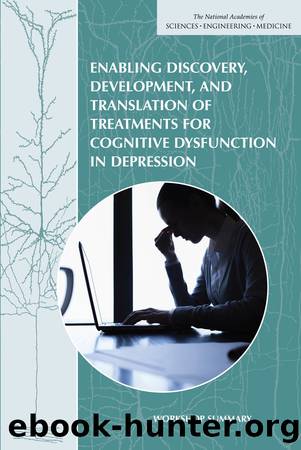Enabling Discovery, Development, and Translation of Treatments for Cognitive Dysfunction in Depression: Workshop Summary by Lisa Bain

Author:Lisa Bain
Language: eng
Format: epub
ISBN: 0309373964
Publisher: The National Academies Press
Published: 2015-11-06T00:00:00+00:00
FIGURE 4-1 Objective versus subjective measures of cognition.
SOURCE: Presented by Maurizio Fava at the IOM Workshop on Enabling Discovery, Development, and Translation of Treatments for Cognitive Dysfunction in Depression, February 24, 2015.
Harveyâs group has been experimenting with interview-based strategies aimed at assessing cognition and function in both patients and informants. When using such measures, the difference between patient and informant reports appears to be especially important. For example, in a recent study of patients with schizophrenia, the single best predictor of everyday disability was the size of the discrepancy between the patientâs assessment of his or her cognition and the clinicianâs impression, with patients tending to significantly overestimate their own cognitive function (Gould et al., 2015). Harvey concluded that patientsâ impressions of the severity of their disturbance was affected by their mood, and not correlated with objective measures.
Several participants expressed concern about the use of self-report measures because of concerns about the effects of mood or the patientâs lack of insight or awareness about their condition. In a study of 30 patients with bipolar depression, patientsâ self-report of their functioning or the severity of their disturbance was uncorrelated with any objective performance-based measures, suggesting that mood or other factors may markedly influence patientsâ self-assessment (Harvey et al., 2015). However, Areán noted that while subjective measures may not be useful as standalone assessments, they can be useful as initial indicators that something is wrong. Moreover, she and Harvey added that in depression, even so-called objective measures are affected by amotivation and anhedonia, and that this can confound the results.
Co-Primary Measures
Harvey noted that in both Alzheimerâs disease and schizophrenia trials, regulators have asked for co-primary measures in addition to cognitive performance, and both performance-based and interview-based measures have been used to determine functional capacity. Co-primary measures are thought to increase the face validity of the trial, resulting in better acceptance by consumers and clinicians, according to Michael Green, professor-in-residence in the Department of Psychiatry and Biobehavioral Sciences at the University of California, Los Angeles, Geffen School of Medicine and Co-Principal Investigator of the MATRICS project. The MATRICS-CT (Co-Primary Translation) initiative conducted a Validation of Intermediate Measures (VIM) study to assess various potential co-primary measures (Green et al., 2011). This study determined that the UPSA correlated well with the MATRICS Consensus Cognitive Battery (MCCB) as the primary outcome measure, while self-reported measures did not.
In another study of patients with schizophrenia, a blinded clinician interview-based assessment (the Schizophrenia Cognition Rating Scale, or SCoRS) correlated with neuropsychological test performance as well as real-world functioning, but self-reported cognitive performance did not (Keefe et al., 2006). The SCoRS also demonstrated sensitivity to treatment effects, said Harvey. However, interviews with the patient but not the informant did not correlate, indicating that sensitivity to treatment effects is not necessarily linked to the questions that are asked, but rather who provides the answers. These data suggest that both clinician interview-based and performance-based assessments of cognition and function correlate with neuropsychological tests, and thus that they are essentially interchangeable.
Harvey described another
Download
This site does not store any files on its server. We only index and link to content provided by other sites. Please contact the content providers to delete copyright contents if any and email us, we'll remove relevant links or contents immediately.
Unwinding Anxiety by Judson Brewer(72992)
The Art of Coaching by Elena Aguilar(53189)
The Fast Metabolism Diet Cookbook by Haylie Pomroy(21130)
Rewire Your Anxious Brain by Catherine M. Pittman(18643)
Healthy Aging For Dummies by Brent Agin & Sharon Perkins RN(17037)
Talking to Strangers by Malcolm Gladwell(13346)
The Art of Thinking Clearly by Rolf Dobelli(10451)
Mindhunter: Inside the FBI's Elite Serial Crime Unit by John E. Douglas & Mark Olshaker(9318)
Crazy Rich Asians by Kevin Kwan(9277)
The Compound Effect by Darren Hardy(8942)
Tools of Titans by Timothy Ferriss(8365)
Periodization Training for Sports by Tudor Bompa(8253)
Becoming Supernatural by Dr. Joe Dispenza(8199)
Wonder by R. J. Palacio(8097)
Crystal Healing for Women by Mariah K. Lyons(7928)
Bodyweight Strength Training by Jay Cardiello(7908)
Change Your Questions, Change Your Life by Marilee Adams(7758)
Therapeutic Modalities for Musculoskeletal Injuries, 4E by Craig R. Denegar & Ethan Saliba & Susan Saliba(7711)
Nudge - Improving Decisions about Health, Wealth, and Happiness by Thaler Sunstein(7690)
